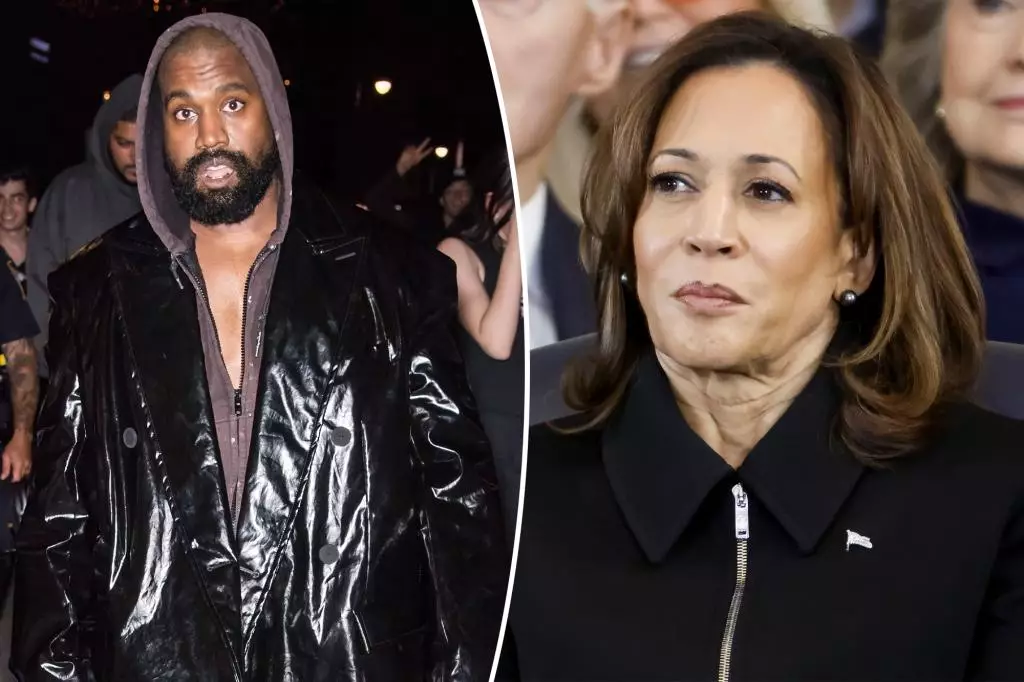The intertwining of celebrity culture with political discourse often leads to controversial and provocative trends that can overshadow substantive discussion. Recently, Kanye West found himself at the center of a media storm after making inappropriate remarks about Kamala Harris, the current Vice President of the United States. This incident not only sparked backlash but also raised larger questions regarding the responsibilities of public figures and the implications of their statements.
Kanye West, a decorated musician and pivotal figure in the entertainment industry, posted a now-deleted tweet that read, “I used to want to f—k Kamala until she lost. I don’t f—k losers anymore.” This crude comment was not just an offhand insult; it seemed to trivialize the Vice President’s political stature while also perpetuating a misogynistic narrative that defines women in terms of their relationship to men and their successes or failures. To further complicate the issue, West followed up with a post about not being controlled by political parties, showing a cavalier attitude toward serious political discourse.
This incident markedly illustrates how celebrities often wield their platforms irresponsibly, leaving a trail of controversy that can overshadow their achievements and detract from important discussions. While humor and hyperbole can be valid modes of expression, they must be placed in context, especially when addressing public figures who represent significant aspects of society.
After the public backlash, West posted an apology to Harris, though one must wonder about the authenticity of such a statement given the tone of his initial remarks. The apology seemed less like a genuine act of contrition and more like a stifling reaction to public opinion. This raises questions about the effectiveness of apologies in today’s social media landscape. Do celebrities genuinely regret their words, or do they merely comply with the expectations of their audience to preserve their public image?
In examining the cultural significance of West’s comments, it is important to consider what they imply about our societal norms. West’s derogatory remarks trivialize the achievements of women in power, showing a blatant disregard for their professional roles. As a society, we must critique the acceptability of such comments, particularly when they contribute to a culture of sexism and undermining women’s authority.
West is emblematic of a trend in which celebrity opinions seep into political discourse, often without the necessary nuance. With celebrities like West feeling empowered to express political views—albeit crudely—it becomes essential to differentiate between informed perspectives and misguided commentary. This raises concerns about the influence of celebrity culture on younger generations who may take statements at face value without critical evaluation.
Moreover, West’s remarks are not an isolated incident. They echo prior incidents from his career where he has used shock value to incite attention. In that sense, it is crucial to assess how such behaviors might inform or mislead public perceptions regarding political discourse. The relationship between celebrity culture and political stances can create dangerous precedents, allowing for superficial engagement with serious issues.
Moving forward, it is essential for public figures like West to recognize the extent of their influence and the responsibility that accompanies it. In our current climate, where social media amplifies messages rapidly, comments can have irreversible consequences. The scrutiny of public figures must extend beyond their artistic contributions and delve into their roles as influencers in societal narratives—particularly those related to politics and gender.
Greater accountability from celebrities could lead to more informed discussions within broader societal contexts, ensuring that the potential for influence does not diminish critical discourse but instead enriches it. It is crucial for influential figures to engage thoughtfully with their platforms, thereby guiding the conversation in a manner that upholds respect and integrity, which society desperately needs.
Kanye West’s comments serve as a stark reminder of the ramifications of blending celebrity culture with political commentary. The public’s reaction and subsequent dialogue can pave the way for more responsible engagement, ensuring that our societal leaders—whether in politics or the arts—reflect the values we wish to see in the world.

Leave a Reply